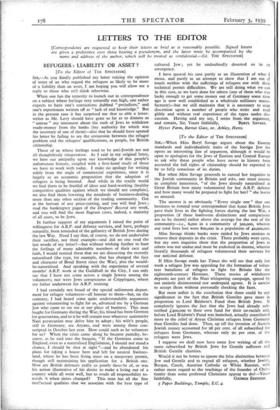LETTERS TO THE EDITOR
[Correspondents are requested to keep their letters as brief as is reasonably possible. Signed letters are given a preference over those bearing a pseudonym, and the latter must be accompanied by the name and address of the author, which will be treated as confidential.—Ed. THE SPECTATOR]
REFUGEES : LIABILITY OR ASSET ?
[To the Editor of THE SPECTATOR]
Snt,—As you kindly published my letter voicing the opinion of some of us who regard the refugees as likely to be more of a liability than an asset, I am hoping you will allow me a reply to those who still think otherwise.
When one has the temerity to launch out in correspondence on a subject where feelings very naturally run high, one rather expects to have one's convictions dubbed " prejudices," and one's experiences written off as " lack of real knowledge." But in the present case it has surprised me that so able a letter- writer as Mr. Levy should have gone so far as to dismiss as " untrue " my statement about the rush of Jews to withdraw ready-money from the banks (my authority for which was the secretary of one of them)—also that he should have opened his letter by failing to see the connexion between the refugee problem and the refugees' qualifications, as people, for British citizenship.
Those of us whose feelings tend to be anti-Jewish are not all thoughtlessly vituperative. As I said in my original letter, we base our antipathy upon our knowledge of this people's unfortunate history, coupled with a first-hand study of those we have to work with today.. I make no apology for writing solely from the angle of commercial experience, since it is largely as an economic proposition that the adoption of refugees is being boosted. And while in the textile world we find them to be fruitful of ideas and hard-working (healthy competitive qualities against which we should not complain), we also find them lowering the standards of business-dealing more than any other section of the trading community. Get at the bottom of any price-cutting, and you will find Jews ; read the bankruptcy pages of the Drapers' Record any week, and you will find the most flagrant cases, indeed, a majority of all cases, to be Jews.
In further support of my arguments I raised the point of willingness for A.R.P. and defence services, and have, perhaps _naturally, been reminded of the gallantry of British Jews during the last War. Need I say that, of course, we do not undervalue their sacrifice, nor their example—and did no one read the last words of my letter?—but without wishing further to hurt the feelings of many admirable members of their race and faith, I would remind them that we are discussing the recently naturalised (the type, for example, that has changed the face and character of Bond Street since the War), also the would- be-naturalised. And speaking with the experience of several months' A.R.P. work at the Guildhall in the City, I can only say that I have not come across a single Jewess among the volunteers; nor were Jews conspicuous at Cripplegate, where my father underwent his A.R.P. training.
I had certainly not heard of the special enlistment depart- ment for refugee volunteers—all honour to them—but, on the contrary, I had heard some quite understandable arguments against volunteering to fight for us, advanced me by a German Jew who came to see me at our place of business. This man fought for Germany during the War; his blood has been German for generations, and to it he will remain true whatever nationality Nazi persecution may drive him to adopt ; his wife's people, still in Germany, are Aryans, and were among those con- scripted in October last year. How could such as he volunteer for us? When the crisis came along he became panicky, be- cause, as he said into the bargain, " If the Germans come to England, even as a naturalised Englishman, I should not stand a chance, I should be shot at sight "—and he abandoned his plans for taking a house here and left for neutral Switzer- land, where he has been living since on a temporary permit, though still maintaining his application for a British one. Now are British defences really so poorly thotmht of, or was his action illustrative of his desire to make a living out of a country while all went well, but to evade all responsibility to- wards it when times changed? This man has all the fine intellectual qualities that we associate with the best type of cultured Jew ; yet he undoubtedly deserted us in an emergency.
I have quoted his case partly as an illustration of what I mean, and partly as an attempt to show that I am out of touch neither with the sufferings of refugees nor with their technical permit difficulties. We are still doing what we can in this case, as we have done for others (one of them who was lucky enough to get some money out of Germany some time ago is now well established ' as a wholesale millinery manu- facturer)-but we still maintain that it is necessary to urge discretion upon a numbed of people who write and read glibly and without real experience of the types under dis- cussion. Having said my say, I retire from the argument,










































 Previous page
Previous page